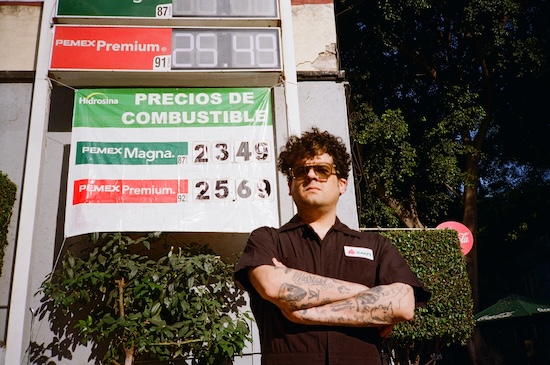For those of us who mostly hear the output of international dance music labels through the internet, the sense of the place can get lost in digital translation. That’s exacerbated by how music is found and shared. The rapid exchange of ideas between global scenes is exciting and necessary, but means that context and specificity can get quickly muddied. This full-length release from Lao, co-founder of the revered club label NAAFI, grounds us in his home of Mexico City, in celebration of the place that’s been central to his music for over ten years. It underlines the forward-looking, anti-conformist streak in the scene he helped to cultivate.
Chapultepec takes its name from one of the largest parks in Latin America, a huge network of trees and people. Designed by Texcocan Tlatoani Nezahualcóyotl, the park has been vital for 600 years. As an ecological space, it’s thought of as Mexico City’s lungs, because its trees replenish oxygen in the city. Today, young people hang out there or over at the Monumento a la Revolución. They skate, talk, play music, and rap, as some kids do in footage from an interview Lao did with Native Instruments as NAAFI was rising. In the video, he listens to them, smiling.
NAAFI’s headquarters are at the edge of Chapultepec, so you can imagine Lao spends a lot of time there. He connects the tracks on this near-ninety-minute collection to the park: its wildlife, history, mythology, sculptures, artefacts and buildings. Like its namesake, there’s an impressive physicality to the songs, in how they use rhythm to push and pull, or percussive weirdness to shake and disorient. Despite DJing and producing since the early 2000s, Lao has retained a newbie’s sense of exploration and mischief. When he lets a rush of delay effects take over on the back half of ‘Alita’, it hits with all the danger of his live sets, whether automated or done on the fly.
NAAFI has never neatly fit under one genre or category. Their music is hyperlocal but outward-looking. Fittingly, this record is keen to contort and combine tribal with techno, bass, digital cumbia, breaks and flashes of reggaeton. Lao is just as known for his DJ-tool bootlegs of pop songs as he is for original material (NAAFI’s bang-for-your-buck PIRATA series has been a godsend to many a DJ). This record retains that punk spirit. Early track ‘Manantial’ needs just a pummelling reversed kick drum to remind you how joyous his approach can be.
Lao grew up enamoured with Basic Channel, grime and Aphex Twin, which he learned about through TV, the internet and friends. You can hear those inspirations in moments, but what makes the record fun is how those influences naturally shift and invert to fit his context. You can hear digital dub in the terrifying bass squelches of opener ‘Axolotyl’, but under his distinct car alarm synth sounds and peripheral percussive patterns, it becomes new. Even the familiar 4/4 thump and ‘Think’ break combination on ‘Umbral’ is fresh and dynamic in his hands.
‘Ha Hypno’ has fun with tresillo polyrhythms, a dembow beat and brash vocal sampling. Its creeping two-note melody rings out until you’re in a trance. Here and throughout, Lao plays with the building blocks of Latin and African dance music, albeit in stark, surprising ways. The loose groove of the title track references cumbia, but it’s matched with stiff synth stabs, muffled bass and lopsided percussion to throw the mix more off balance. That makes for a satisfying progression when its elements snap together over a head-knocking beat.
This is a record full of ideas. Like much of NAAFI’s output, it works as a grab-bag of assorted dance tracks, but there’s a cohesion to its vision, too. ‘Carcamo De Dolores’ has an addictive percussive centre that could slot into labelmate Omaar’s essential Drum Temple album, if not for the moments where it expands with sweet and gentle melodies. Then, the following ‘Cincalco’ has a tough, masculine groove which is offset by mournful keys and a slow-churning climax.
The park’s influence is made obvious on ‘Virreyes’, where sampled birdsong and digital flutes bob in and out. Somehow, it doesn’t sound hackneyed. That’s difficult to do, given all the rubbish tracks about that throw birdsong or pan flutes in for no good reason. That’s because there’s edge and texture to how Lao produces. His flute sounds are alien and characterful – to the point where I might be totally wrong that he was going for flutes. The birdsong is bleating in the way that birds are when you’ve just woken up and the sun is in your eyes. That grit is true to his approach to rhythm as well. On this track, a polyrhythmic melody becomes the rigid element. All percussion and noise swirl around it, demonstrating the hold he has over grooves and how they can be wielded.
The record slows and darkens in its back half. The sun goes down over the park. There’s room for the seven-minute dissonant synth experiment ‘El Dondé Estamos’, the excellent nocturnal bass track ‘Lo Pregunto’, and ‘Sepulcro’, a netherworld club cut that’s more minimal and reflective than what appears early on the record. Lao presents a varied picture of what the Mexico City underground has to offer, and what he has offered to his city.
Of course, NAAFI doesn’t just represent Mexico City anymore. The label’s current roster is diverse and cross-continental. Rather than waving the flag for one place or sound, they represent music without limits or restrictions, and club culture that’s genuinely inclusive to new ideas and diverse groups. Chapultepec ends with ‘Lago Menor’, an aquatic synth passage named after the smaller lake in the park, where people come to hang out, in a city that’s historically had a lack of free public spaces to do that. It makes sense that someone like Lao would hold its communal appeal in high regard.


